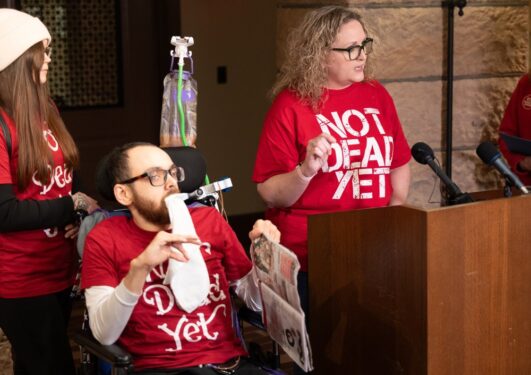
WASHINGTON – Nineteen states this year are considering legislation to allow doctors to prescribe end-of-life drugs to terminally ill patients.
Ten states and the District of Columbia already allow some form of physician-assisted suicide, a practice Oregon was the first to legalize in 1994.
In New York, an assisted-suicide measure called the Medical Aid in Dying Act, has stalled for nine years in the legislature but is slowly gaining momentum. If it passes, it would allow people who are terminally ill, with a prognosis of no more than six months to live, the option to request medication they can administer themselves to bring about their deaths.
New York’s Catholic Conference, like many Catholic conferences across the country, has spoken up strongly against this proposed legislation and is urging Catholics in the state to contact their representatives and tell them to vote against it.
On Feb. 4, the Catholic Conference issued a memorandum of opposition to the bill, saying it “devalues human life” and sends a message that “our most vulnerable populations are not worth the resources it might take to improve their lives. Those most at risk of being taken advantage of and discarded by the health system will be endangered further.”
The state’s Catholic conference, the public policy arm of New York’s bishops, also stressed that legalized assisted suicide would “blur longstanding medical, moral, and legal distinctions between withdrawing extraordinary medical assistance and taking active steps to destroy human life.”
It stressed that the government should “remove barriers and improve access to palliative care and hospice care for those in the final stages of terminal illness. Improved education and training of physicians in pain management, together with appropriate diagnosis and treatment for depression, would go a long way toward eliminating calls for suicide among the sick and the dying.”
Some of the other states considering similar bills this year include Minnesota, Virginia, Massachusetts, Illinois, Indiana, Maryland, Florida, and Tennessee. Just this week these measures failed in Maryland, Indiana, and Virginia.
The Minnesota bill would similarly allow adult patients who are suffering terminal illnesses and have less than six months to live to obtain drugs to end their own lives. It requires that two providers, one of whom must be a physician, would have to certify that the patient meets the criteria.
Patients would have to have the mental capacity to make their own health care decisions and provide informed consent, so those with dementia would not qualify. The bill does not require that patients be Minnesota residents.
The Minnesota Catholic Conference said in a recent action alert that the new bill is “one of the most aggressive physician-assisted suicide bills in the country.” It also stressed that the law would violate the teaching of the Catholic Church
“As Catholics, we are called to uphold human dignity,” the Catholic conference said, adding that “legalization of assisted suicide works against this principle because death is hastened when it is thought that a person’s life no longer has meaning or purpose.”
The bishops of Maryland, another state that was taking up this legislation this year, released a statement Jan. 30 expressing their disappointment that this issue is once again up for debate.
“The central tenet guiding our opposition to this deadly proposal is that all human life is created in the image and likeness of God and therefore sacred,” said the statement released by the Maryland Catholic Conference.
“In 2024, medical advancements and improvements in pain management mean we can make individuals with terminal illnesses comfortable and improve the quality of the remainder of their lives without them feeling the need to reluctantly choose a ‘dignified death’” the statement said.
The state’s bishops also stressed that in other states or countries that have this legislation, abuses have occurred and “vulnerable people — including those with disabilities, the poor, and those who are isolated — can be manipulated.”
In Virginia, which also looked at an assisted suicide measure, the state’s bishops reiterated a similar message voiced by bishops in other states considering these laws.
They also added that “people facing the end of life are in great need and must be accompanied with great care and attentiveness. To address each of their needs and alleviate their suffering, patients deserve high quality medical, palliative, and hospice care — not suicide drugs.”
Catholic bishops have long spoken out against assisted suicide measures, using Church teaching, Vatican documents, and words of popes to back them up.
According to the Catechism of the Catholic Church, “intentional euthanasia, whatever its forms or motives, is murder” and “gravely contrary to the dignity of the human person and the respect due to the living God.”
This teaching was reaffirmed in the 2020 Vatican document “Samaritanus Bonus” from the Congregation for the Doctrine of the Faith that reaffirms the Church’s teaching on care for those who are critically ill or dying.
Pope Francis has also frequently spoken out against assisted suicide and in favor of palliative care. In 2019, he told a group of Italian doctors: “We can and must reject the temptation, also induced by legislative changes, to use medicine to support a possible willingness of the patient to die, providing assistance for suicide or directly causing death by euthanasia.”
